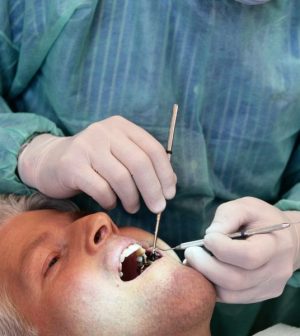- Could Your Grocery Store Meat Be Causing Recurring UTIs?
- Are You Making This Expensive Thermostat Error This Winter?
- Recognizing the Signs of Hypothyroidism
- 10 Strategies to Overcome Insomnia
- Could Artificial Sweeteners Be Aging the Brain Faster?
- Techniques for Soothing Your Nervous System
- Does the Water in Your House Smell Funny? Here’s Why
- Can a Daily Dose of Apple Cider Vinegar Actually Aid Weight Loss?
- 6 Health Beverages That Can Actually Spike Your Blood Sugar
- Treatment Options for Social Anxiety Disorder
Dentists Prescribe Antibiotics Far Too Often: Study

Dentists tend to be overeager when it comes to prescribing antibiotics, new research suggests.
The study authors found that antibiotics prescribed to prevent infection during dental procedures weren’t necessary 81% of the time. That’s important because 10% of all antibiotic prescriptions come from dentists, the researchers said.
“Preventive antibiotics in these patients gave them risks that outweighed the benefits,” researcher Jessina McGregor, an associate professor at Oregon State University in Corvallis, said in a university news release.
Antibiotics have been recommended to dental patients who have certain heart conditions to prevent mouth bacteria from infecting the heart, the researchers explained.
But antibiotics can cause serious side effects and contribute to the growing problem of antibiotic resistance.
Using a national database, McGregor and her colleagues collected data on nearly 170,000 antibiotic prescriptions from dentists between 2011 and 2015. Prescriptions were for more than 90,000 patients.
Although 90% of the patients had a procedure that might require an antibiotic, less than 21% had a heart condition that fell under that recommendation.
Across the country, the number of unnecessary antibiotic prescriptions varied by region, the findings showed. Most were in the West — of more than 13,700 prescriptions written, 11,600 (85%) didn’t follow prescribing guidelines.
In the Northeast, 78% of the prescriptions were unnecessary, as were 83% in the Midwest and 80% in the South, the researchers said.
Cities accounted for 82% of unnecessary prescriptions, and rural areas accounted for 79%, according to the report.
The researchers used a broad definition of high-risk cardiac patients, which suggests the number of unnecessary antibiotic prescriptions may be even higher.
Researcher Susan Rowan, of the University of Illinois at Chicago College of Dentistry, added that “dental providers should view this study, which is the first to look at preventive antibiotic prescribing for dental procedures, as a powerful call to action, not a rebuke.”
The study was published online May 30 in JAMA Network Open.
More information
Visit the U.S. Centers for Disease Control and Prevention for more on antibiotics.
Source: HealthDay
Copyright © 2026 HealthDay. All rights reserved.










